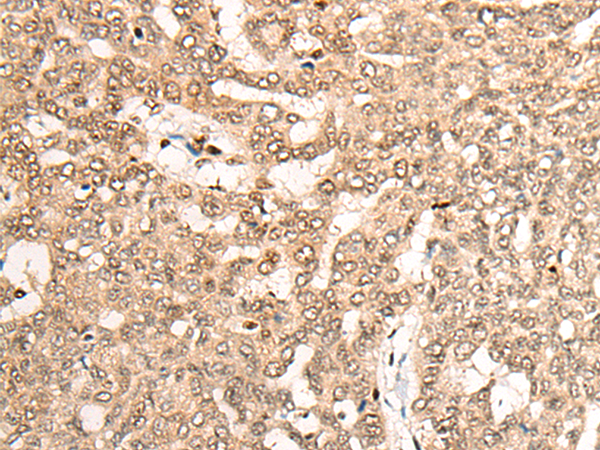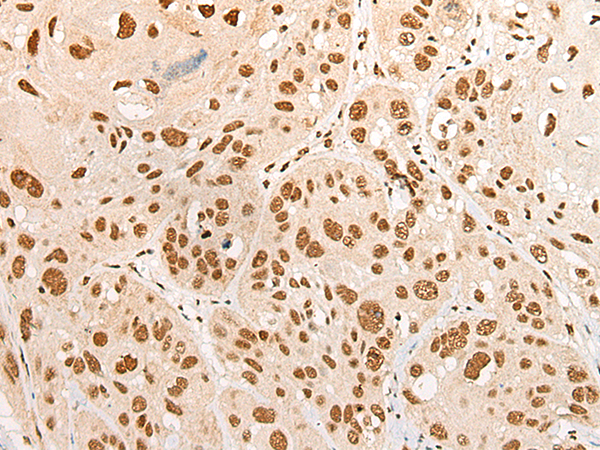

| WB | 咨询技术 | Human,Mouse,Rat |
| IF | 咨询技术 | Human,Mouse,Rat |
| IHC | 1/25-1/100 | Human,Mouse,Rat |
| ICC | 技术咨询 | Human,Mouse,Rat |
| FCM | 咨询技术 | Human,Mouse,Rat |
| Elisa | 1/5000-1/10000 | Human,Mouse,Rat |
| Aliases | CSN7; CSN7A; SGN7a |
| Host/Isotype | Rabbit IgG |
| Antibody Type | Primary antibody |
| Storage | Store at 4°C short term. Aliquot and store at -20°C long term. Avoid freeze/thaw cycles. |
| Species Reactivity | Human, Mouse |
| Immunogen | Fusion protein of human COPS7A |
| Formulation | Purified antibody in PBS with 0.05% sodium azide and 50% glycerol. |
+ +
以下是关于COPS7A抗体的3篇参考文献,简要总结如下:
1. **文献名称**:*The COP9 signalosome regulates autophagy and disease pathogenesis through modulation of ULK1 stability*
**作者**:Liu J, et al.
**摘要**:研究利用COPS7A抗体进行免疫共沉淀实验,发现COP9信号复合体(包括COPS7A)通过调控ULK1蛋白稳定性影响自噬过程,与神经退行性疾病相关。
2. **文献名称**:*Cops7a is essential for murine embryogenesis and postnatal development*
**作者**:Tao Y, et al.
**摘要**:通过COPS7A抗体在小鼠模型中的Western blot和免疫组化分析,证明COPS7A缺失导致胚胎致死,提示其在发育中起关键作用。
3. **文献名称**:*Proteomic analysis of COP9 signalosome interactions reveals its role in DNA damage response*
**作者**:Smith LM, et al.
**摘要**:利用COPS7A抗体的质谱分析,揭示COP9复合体(含COPS7A)参与DNA损伤修复通路,并与多种癌症的化疗耐药性相关。
如有其他需求可进一步补充。
The COPS7A antibody targets the COP9 signalosome subunit 7A (COPS7A), a key component of the COP9 signalosome (CSN), an evolutionarily conserved multi-protein complex involved in regulating ubiquitin-proteasome-mediated protein degradation. The CSN complex, comprising eight subunits (CSN1–CSN8), interacts with cullin-RING ubiquitin ligases (CRLs) to modulate their activity via deneddylation, a process critical for maintaining protein homeostasis. COPS7A (also termed CSN7A) is one of two paralogs (CSN7A and CSN7B) in mammals, sharing structural homology but exhibiting distinct tissue-specific expression patterns. It plays a role in stabilizing the CSN complex and facilitating substrate recognition during proteasomal degradation.
COPS7A antibodies are widely used in research to investigate CSN assembly, CRL regulation, and cellular processes like DNA repair, cell cycle control, and stress responses. Dysregulation of COPS7A has been linked to cancers, neurodegenerative disorders, and immune diseases, highlighting its therapeutic relevance. These antibodies enable detection of COPS7A expression levels via techniques such as Western blotting, immunofluorescence, and immunohistochemistry, aiding studies on protein turnover mechanisms and disease pathways. Validation typically includes knockout controls to ensure specificity for distinguishing between CSN7A and CSN7B isoforms.
×